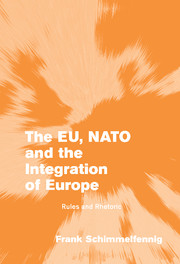Book contents
- Frontmatter
- Contents
- List of figures
- List of tables
- Acknowledgments
- List of abbreviations
- Introduction
- PART I Security, power or welfare? Eastern enlargement in a rationalist perspective
- PART II Expanding the Western community of liberal values and norms: Eastern enlargement in a sociological perspective
- PART III Association instead of membership: preferences and bargaining power in Eastern enlargement
- 7 Process hypotheses
- 8 State preferences and the initial enlargement process
- Conclusion: the double puzzle of Eastern enlargement
- PART IV From association to membership: rhetorical action in Eastern enlargement
- Strategic action in international community: concluding remarks
- Appendix (Interviews)
- List of references
- Index
7 - Process hypotheses
Published online by Cambridge University Press: 22 September 2009
- Frontmatter
- Contents
- List of figures
- List of tables
- Acknowledgments
- List of abbreviations
- Introduction
- PART I Security, power or welfare? Eastern enlargement in a rationalist perspective
- PART II Expanding the Western community of liberal values and norms: Eastern enlargement in a sociological perspective
- PART III Association instead of membership: preferences and bargaining power in Eastern enlargement
- 7 Process hypotheses
- 8 State preferences and the initial enlargement process
- Conclusion: the double puzzle of Eastern enlargement
- PART IV From association to membership: rhetorical action in Eastern enlargement
- Strategic action in international community: concluding remarks
- Appendix (Interviews)
- List of references
- Index
Summary
Modes of action
The process hypotheses – postulating how the decision to expand NATO and the EU came about – draw on different modes of action and posit different conditions that produced the enlargement outcome. I will formulate and examine four such hypotheses: habitual, normative, communicative and rhetorical action. In this section, I classify these hypotheses according to an abstract criterion. In later sections and chapters, they will be explained in greater detail and translated into concrete expectations on NATO and EU enlargement. The criterion I propose for classifying the process hypotheses is the conceptual point at which the community rules are assumed to affect the decision-making process on enlargement. In other words, it is the point in the sequence of social action up to which the process is considered to be determined by individual choices and bargaining power alone.
In abstract terms, the process of social action can be conceived as a sequence of four stages or levels. The first is cognitions, that is, the set of beliefs or ideas actors hold about the world and the actors' ways of thinking and making decisions. The second level is the goals actors set for themselves and seek to attain through their actions. The third is the individual behavior actors choose in light of their goals and cognitions. Finally, two or more individual behaviors form an interaction that brings about a collective outcome. Social rules can become influential at each of these stages or levels.
- Type
- Chapter
- Information
- The EU, NATO and the Integration of EuropeRules and Rhetoric, pp. 157 - 163Publisher: Cambridge University PressPrint publication year: 2003



